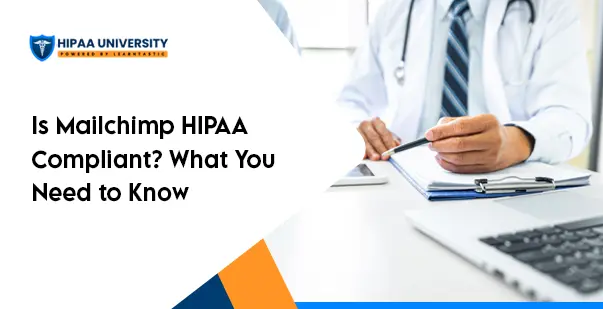Is Mailchimp HIPAA Compliant? What You Need to Know

September 2, 2024
Table of Contents
- Introduction
- What is HIPAA Compliance?
- Key Aspects of HIPAA Compliance
- What is Mailchimp?
- Is Mailchimp HIPAA Compliant?
- Risks of Using Mailchimp for Healthcare-Related Communications
- HIPAA-Compliant Alternatives to Mailchimp
- Final Thoughts
Data security is of the utmost importance in healthcare or any other industry in general. The Health Insurance Portability and Accountability Act (HIPAA) is responsible for ensuring that all measures are followed to protect patient health information (PHI). For this reason, it is important to follow compliance standards when using tools like Mailchimp for email marketing.
While many organizations trust and use MailChimp for its features, HIPAA requires such marketing tools to sign a Business Associate Agreement (BAA), which MailChimp did not. Hence, can MailChimp be HIPAA compliant?
This question is also one of the most critical for specific healthcare organizations planning to use this tool. When receiving and processing patient information, the principles of HIPAA should be adhered to. In this blog, we will answer whether Mailchimp is HIPAA-compliant; if not, then why?
What is HIPAA Compliance?
HIPAA compliance means following the rules set by the Health Insurance Portability and Accountability Act (HIPAA) to protect people’s medical information. It involves taking steps to keep health information private and secure so that it is stored, handled, and shared safely. Any organization that deals with health information, like doctors, insurance companies, and even some marketing tools, must follow these rules to avoid legal issues and keep their clients’ trust.
HIPAA compliance applies to several entities. These include healthcare plans, providers, clearinghouses, and any business associates that handle Protected Health Information (PHI). The U.S. Department of Health and Human Services (HHS) oversees HIPAA stipulations, and the Office for Civil Rights (OCR) enforces them.
-
Goals of HIPAA Compliance
HIPAA compliance is essential for safeguarding sensitive health information and ensuring that organizations handle patient data responsibly. By adhering to HIPAA regulations, organizations not only protect patient privacy but also build trust and maintain the integrity of their operations. Here are the primary goals of HIPAA compliance:
- Limit the use of Protected Health Information (PHI) to those who need it.
- Impose penalties on those who do not follow HIPAA regulations.
- Ensure the security and privacy of sensitive patient information.
-
Penalties for HIPAA Violations
For civil violations, individuals who unknowingly break HIPAA rules may face a $100 fine per violation. There is an annual cap of $25,000 for repeated violations. If willful neglect of HIPAA rules is not corrected in time, penalties can reach $50,000 per violation. The annual maximum is $1.5 million.
-
Criminal Penalties for HIPAA Violations
In cases of criminal violations, covered entities that knowingly and willfully disclose identifiable health information may face monetary penalties and imprisonment of up to one year.
Also Read: What is HIPAA Certification?
Key Aspects of HIPAA Compliance
While there are a wide range of aspects of HIPAA, the main three rules govern the implementation of HIPAA regulations. These are as follows:
-
HIPAA Privacy Rule
The Privacy rule protects the privacy of individually identifiable health information. This includes medical records and other personal health information held and potentially disclosed by business associates and covered entities.
The rule requires covered entities such as healthcare providers and clearinghouses to obtain written consent from individual patients before using their PHI for purposes other than payment, treatment, and healthcare operations.
-
HIPAA Security Rule
The Security Rule of HIPAA complements the privacy rule by ensuring a certain standard in protecting electronic protected health information (e-PHI). The Security rule is implemented on the covered entities and their various business associates who are entitled to create, maintain, receive, and transfer e-PHI to ensure the integrity, confidentiality, and availability of the information.
-
HIPAA Breach Notification Rule
The HIPAA breach notification rule covers the covered entities to alert affected individuals, the Department of Health and Human Services (HHS) and sometimes, also the media during an infringement of unsecured PHI. Such notifications are made without making any due delay and within 60 days after the discovery of the breach.
What is Mailchimp?
Mailchimp is a popular email marketing platform for the healthcare industry, e-commerce, education, and nonprofits. It lets businesses and individuals create emails, send them out, and manage their campaigns. Over time, Mailchimp has added more digital marketing tools beyond email. Founded in 2001, it has become one of the top email services today.
- Email marketing is a cost-effective way to reach many people. Healthcare organizations use Mailchimp to easily create and customize emails for their patients, manage their email lists, and personalize messages so that they’re relevant to each patient.
- The platform allows organizations to segment their audience based on parameters like age or health interests and automate emails such as appointment reminders, follow-ups, and health tips.
- Mailchimp also helps track the success of these email campaigns by analyzing metrics like the number of people who open the emails, click on links, or take action.
- The platform is easy to use, even for those without much technical knowledge, making it a great option for improving patient communication and engagement.
Is Mailchimp HIPAA Compliant?
Many healthcare organizations are using email marketing platforms like Mailchimp to efficiently handle patient communications. Nevertheless, healthcare professionals and administrators often wonder if Mailchimp is HIPAA compliant.
This important investigation requires a comprehensive review of Mailchimp’s functionalities, how it can be used in healthcare environments, and the consequences of its usage within the parameters of HIPAA guidelines. Healthcare organizations must comprehend these factors in order to uphold patient confidentiality while making the most of digital communication tools.
- Mailchimp Does Not Sign Business Associate Agreements (BAAs): HIPAA requires that any service handling PHI must sign a BAA to ensure compliance. Mailchimp does not sign BAAs, which means it does not meet this critical requirement.
- Users are Responsible for Compliance: Mailchimp’s terms of service state that users are responsible for ensuring they follow all applicable laws, including HIPAA. This places the burden of compliance on the user rather than the platform itself.
- Security Controls:While Mailchimp does offer some security features, such as encryption, these alone do not satisfy the full requirements of HIPAA compliance without a BAA in place.
- Not Suitable for PHI: Due to the lack of a BAA, Mailchimp is not recommended for sending emails that contain PHI or for any activities that require strict HIPAA compliance.
- Alternative Options: For healthcare email marketing, it is advised to use a service that explicitly supports HIPAA compliance and signs a BAA to ensure all legal requirements are met.
Read more: What Is The Purpose of HIPAA in 2024?
Risks of Using Mailchimp for Healthcare-Related Communications
Various risks can occur if Mailchimp is used for the communication purposes of healthcare facilities. Some of these risks are:
-
Obedience to HIPAA
Healthcare facilities in the U.S. must comply with HIPAA regulations, which are designed to protect sensitive patient information. Mailchimp, however, is not HIPAA-compliant, meaning it doesn’t meet the required standards for handling Protected Health Information (PHI). Using Mailchimp to send emails that include PHI could lead to HIPAA violations. This results in legal penalties and a loss of trust between patients and healthcare providers. To ensure compliance, healthcare organizations should opt for platforms that are specifically designed to meet HIPAA requirements.
-
Data Security
Data security is a critical concern when handling sensitive healthcare information. While Mailchimp does offer some security features, it may not provide the level of protection required for transmitting sensitive data in the healthcare industry.
Issues like inadequate encryption, insufficient data storage practices, and weak access controls can leave patient information vulnerable to unauthorized access. These security gaps can lead to data breaches, compromising patient privacy and exposing healthcare organizations to significant risks.
-
Confidentiality
Maintaining the confidentiality of patient information is essential in healthcare communication. Email, as a communication method, is inherently less secure than other options. When using Mailchimp to send confidential patient information, there is a higher risk that unauthorized parties could access this information.
A breach of confidentiality can damage the trust between patients and their healthcare providers, leading to serious consequences for both parties.
-
Unintentional Disclosure
One of the risks associated with using email for healthcare communication is the potential for unintentional disclosure. Mistakes, such as sending an email to the wrong recipient, can lead to the accidental release of sensitive patient information.
With Mailchimp’s bulk emailing features, the risk of such errors increases. These unintentional disclosures can result in significant privacy violations, putting both patients and healthcare organizations at risk.
-
Informed Consent
Informed consent is a fundamental aspect of healthcare communication. Patients must give explicit permission before their information is used or shared. However, Mailchimp’s default settings may not fully support the rigorous consent requirements needed in healthcare.
Sending emails without proper patient consent can lead to legal issues and a breakdown in communication transparency. Healthcare organizations must ensure that they have the appropriate systems in place to obtain and document patient consent before using email as a communication tool.
-
Sensitivity of the Content
Healthcare-related content is often highly sensitive and must be handled with care. Mailchimp, while effective for general marketing, may not be well-suited to handle the specific needs of healthcare communication. The platform’s general-purpose design might not offer the specialized features necessary to manage sensitive healthcare information properly.
Inadequate handling of healthcare content can lead to misinformation, miscommunication, and potential harm to patients.
Final Thoughts
The answer to whether Mailchimp can be HIPAA compliant is clear: it cannot. It should not be used for any digital communications, including emailing, that involve PHI. Healthcare organizations must choose alternatives specifically designed to comply with HIPAA regulations.
As a member of the public, it’s crucial to understand these regulations and your rights as a U.S. citizen. Protecting your health information is vital. To gain deeper insights into how tools like Mailchimp can violate your Protected Health Information and how to safeguard your healthcare rights, enroll in a HIPAA course today.





